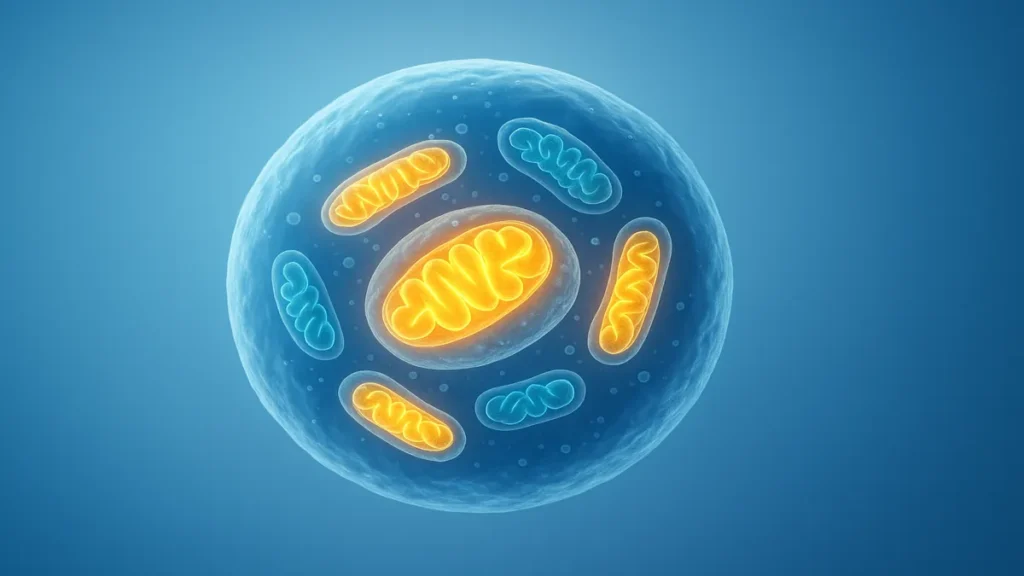
How mitochondria affect fatigue and weight gain is often overlooked. Yet, in many cases, it explains why you feel exhausted, gain fat easily, and still hear that everything looks “normal” in your blood work.
Sure, you eat healthy most days. Plus, physical activity is part of your routine. At night, you even aim for quality sleep. However, the brain fog doesn’t lift. Your energy crashes too early. And despite all efforts, the stubborn fat refuses to move.
Clearly, it’s not a matter of motivation or discipline — it’s a cellular issue.
In fact, when your mitochondria — the energy engines inside your cells — begin to slow down, your body shifts. It stores more fat. It produces less usable energy. As a result, everything feels heavier, slower, and harder to manage.
Fortunately, you can reverse this pattern. By restoring mitochondrial function naturally, you can reignite your energy, sharpen your mind, and boost fat burning from the inside out.
👉 Want real energy and metabolic support? See our top supplement picks here.
What Are Mitochondria and Why They Matter

Although many ignore them, mitochondria affect nearly every system in your body. Inside each cell, they work hard to convert nutrients into ATP — the purest, most usable form of energy. That energy fuels your muscles, brain, metabolism, and even your ability to burn fat.
As a result, when mitochondria perform well, you feel sharp, energized, and strong. You burn calories more efficiently. You recover faster after activity. And your brain stays focused longer.
But when they slow down — whether from age, stress, inflammation, or nutrient gaps — your entire system begins to struggle. Fatigue creeps in. Fat builds up. Recovery slows. You feel like you’re doing everything right, but nothing works.
In fact, mitochondrial dysfunction is one of the most overlooked reasons people can’t lose weight or maintain energy. It affects how well you metabolize food, manage stress, and stay lean.
Fortunately, by improving mitochondrial health, you can change everything. With the right support — including proper nutrients, better habits, and science-backed supplements — your energy can return, your metabolism can rise, and your body can start burning fat more efficiently.
Signs Your Mitochondria Might Be Struggling

Sometimes, the signs are subtle. Other times, they’re impossible to ignore. Either way, when your mitochondria start to underperform, your entire system feels it.
First, you notice fatigue — the kind that doesn’t go away after sleep. Even with a full night of rest, you wake up tired. As the day goes on, energy runs out faster than it should.
Then, weight starts to creep up. Even if your meals stay the same and you’re moving regularly, your body seems to store more fat. That’s because sluggish mitochondria burn fewer calories, even at rest.
In addition, mental clarity often fades. You struggle to focus. Motivation dips for no clear reason. And small tasks feel harder than usual.
You might also feel winded more easily. Or you notice your energy comes in waves — sometimes sharp, but mostly inconsistent.
Individually, these signs may seem minor. But together, they point to a deeper issue: your cells aren’t producing enough energy. Fortunately, once you recognize the pattern, you can take action — and give your mitochondria the support they need.
The Link Between Mitochondria, Metabolism, and Fat Burning

Mitochondria don’t just produce energy — they set the pace for your entire metabolism. When they function well, your body burns calories efficiently. You feel alert, light, and energized.
But when energy production drops, everything else slows too. As a result, your metabolism enters a kind of low-power mode. Fewer calories get burned. More fat gets stored.
In this state, your cells become conservative. They stop spending energy freely and start protecting it. That shift leads to weight gain, even if your habits haven’t changed.
Furthermore, exercise becomes less effective. Without strong mitochondrial output, your body can’t access enough fuel. So, workouts feel harder — and results come slower.
Worse, you may notice increased cravings. That’s because your body tries to make up for low energy with quick calories, especially sugar. Unfortunately, this only feeds the problem.
Fortunately, supporting your mitochondria flips this switch. As they regain strength, your metabolism wakes up. You burn more fat — even when resting. And energy flows more steadily throughout the day.
What Causes Mitochondrial Dysfunction?

Mitochondria are powerful — but they’re also vulnerable. Over time, many factors can damage them and reduce their performance.
First, oxidative stress plays a major role. It builds up when your body produces more free radicals than it can neutralize. As a result, mitochondria lose efficiency and start to slow down.
At the same time, nutritional deficiencies make things worse. Without key nutrients like CoQ10, magnesium, or vitamin B12, your cells can’t create enough energy. Even small gaps in these nutrients can weaken the entire system.
In addition, aging adds another layer. As you grow older, mitochondria naturally decline. Combined with chronic inflammation, the damage compounds.
But lifestyle matters too. Poor sleep, lack of movement, and high toxin exposure push your mitochondria into survival mode. They produce less energy. They burn fewer calories. And they stop working at full speed.
Fortunately, once you understand what’s disrupting your mitochondria, you can take targeted steps to restore them. That includes better nutrition, smarter habits, and the right supplements.
How to Support Mitochondria Naturally

The good news? You can support your mitochondria with simple daily choices — no extreme changes required. Small shifts in diet, lifestyle, and supplementation often create powerful results over time.
Diet
First, focus on foods that fight oxidative stress. Antioxidants from berries, leafy greens, and colorful vegetables help protect your cells. They reduce damage and support cleaner energy production.
Next, add the right fats. Omega-3s from fish or flax, plus olive oil, nourish your cell membranes. As a result, your mitochondria function more efficiently.
Lifestyle
Beyond food, your daily habits matter. Sunlight in the morning helps reset your body clock and boosts energy naturally. Gentle activity like walking improves oxygen use — which mitochondria love.
Also, deep, restorative sleep is essential. It’s during rest that your cells repair and reset. Without it, even great nutrition can fall short.
Targeted Supplementation
Finally, certain nutrients provide direct mitochondrial support. CoQ10 helps generate ATP. PQQ promotes new mitochondria. Alpha-lipoic acid (ALA) supports antioxidant defense and fat metabolism.
Combined, these compounds boost energy, fat burning, and resilience from the inside out.
👉 Want to support your mitochondria and metabolism naturally? Check our expert-reviewed picks here.
When to Take Action (and What to Expect)

If you’ve noticed the signs — low energy, brain fog, stubborn weight — the best time to act is now. The longer you wait, the more your mitochondria weaken. Fortunately, progress often comes quickly when you support them the right way.
In fact, many people start feeling better within the first 5 to 10 days. Energy levels rise. Focus returns. And everyday tasks feel easier.
Within 2 to 4 weeks, your metabolism begins to stabilize. As a result, fat loss becomes smoother and more sustainable — without extreme diets or stimulants.
Around the same time, mental clarity improves. You may feel more alert, more motivated, and less emotionally drained. Even your mood may lift — because cellular energy affects everything, including how you feel.
Step by step, your body regains control. And the more consistent your support, the stronger your results.
Conclusion — Stronger Mitochondria, Better Energy and Fat Loss

In the end, it all comes down to your mitochondria. These tiny engines control how much energy you feel — and how effectively you burn fat. If they struggle, your body stores more and does less. But when they thrive, everything becomes easier.
By supporting them through smart nutrition, daily habits, and targeted supplements, you give your body the tools to perform better — naturally and sustainably. Energy rises. Fat starts to move. And focus comes back.
So, if you’re ready to stop fighting your body and start working with it, this is the perfect moment to act.
👉 Ready to feel energized and burn fat smarter? Start here.
FAQ — Mitochondria, Fatigue, and Metabolism: Your Questions Answered
Yes — and here’s why. When your mitochondria produce less energy, your metabolism slows down. As a result, your body burns fewer calories and stores more fat, even if your routine stays the same.
You might notice constant fatigue, even after rest. Brain fog becomes more frequent. You struggle with stubborn fat that won’t move. In addition, recovery after physical effort takes longer than usual.
Several factors help. Consistent, restorative sleep gives your cells time to repair. Nutrient-rich foods provide fuel and protection. Light physical activity boosts oxygen use. And most importantly, targeted supplements can reactivate cellular energy production.
For many people, energy improves within 5 to 7 days. Fat loss results, however, usually appear within 2 to 4 weeks. That said, consistency is key — the longer you support your mitochondria, the better your results.



















